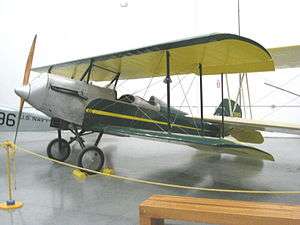American Eagle Aircraft Corporation



The American Eagle Aircraft Corporation was an American aircraft design and manufacturing company which existed briefly in Kansas, but which was a victim of the Great Depression, after building some 500 light airplanes, many of which were the Model A-129, a design attributed to noted aviation pioneer Giuseppe Mario Bellanca.
History
The American Eagle Aircraft Corporation was started in 1925 in Kansas City, Kansas by Edward E. Porterfield. It was incorporated in Delaware in September 1928.
Porterfield was running a flying school at the Fairfax Airport outside Kansas City. He had been operating Jennies and Lincoln Standard biplane trainers, and felt the need for a more suitable and better-performing trainer aircraft. He consulted with several aeronautical engineers of the period, including Bellanca, and soon launched the production of several light single-engine two-seat high-wing and biplane aircraft.
Late in 1929, the worldwide stock market crash severely depressed the sale of non-essential items such as sport airplanes, although American Eagle continued producing airplanes until 1931. Early in that year, Porterfield's company declared bankruptcy and halted production. On 15 May 1931, the company's assets were purchased by the Lincoln-Page Aircraft Company of Lincoln, Nebraska, and Porterfield assumed the title of aircraft sales representative of that company, which became known as the American Eagle-Lincoln Aircraft Corporation, with production headquarters in Lincoln.
Porterfield left the company in 1932, later forming the Porterfield Aircraft Corporation, and died of a heart attack in 1948. Victor Roos, a co-founder of the 1921 Roos-Bellanca Aircraft Company in Omaha, Nebraska, had left a management position with the Swallow Aircraft Company in 1928, and was tapped to head the American Eagle-Lincoln Aircraft Corporation. Most of the new company's effort went into producing the Eaglet, but the depth of the Depression soon killed this effort.
During the six years of its existence, the American Eagle company (including its merged existence with Lincoln-Page) produced over 700 airplanes. At the time of the Depression it was the world's third-largest aircraft production company. It held 8 Approved Type Certificates.
Products
- Eagle Model A-1: Three-place biplane open-cockpit aircraft of conventional configuration. Designed by Waverly Stearman. First flew in April 1926; received Approved Type Certificate #17 in November 1927 using a Curtiss OX-5 V8 engine. Various versions were produced, powered by various available inline engines.
- Eagle Model A-101: Improved version of the A-1, with ailerons on the lower wing and other improvements. During May 1928, A-101 production was 12 airplanes per week; unit price was $2,815. About 300 of the A-1 and A-101 aircraft were built.
- Eagle Model A-129: Similar to the A-1, but with a five-cylinder Kinner radial engine. Since the Kinner was considerably lighter than the OX-5, it had to be mounted in a longer nose in order to maintain balance, leading to the A-1/A-101 being known as "short-nose Eagle", and the A-129 being known as "long-nose Eagle". However, the A-129 was also sold with other available engines, including the OX-5.
- Eagle Model A-139
- Eagle Model A-201
- Eagle Model A-229
- Eagle Model A-329
- Eagle Model A-429
- Eaglet Model A-230 Eaglet: Single-place high-wing monoplane open-cockpit aircraft of conventional configuration. Powered by various small radial engines of 25-45 hp range. A well-preserved example of the Eaglet with a three-cylinder Szekley radial is at the Arkansas Air Museum.
- Eagle Model A-231 Eaglet
- Eagle Model A-31 Eaglet
- Eagle Model B-31 Eaglet
- Eagle Model B-32 Eaglet
External links
| Wikimedia Commons has media related to American Eagle aircraft. |